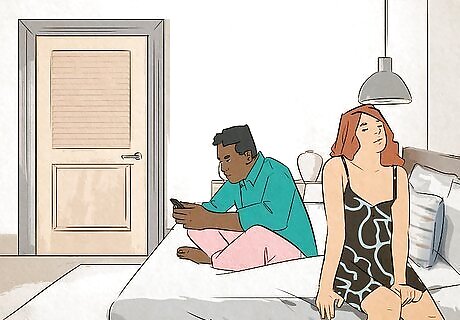
views
- Sexting someone is cheating if you and your partner have established that it’s cheating, but if not, it’s possible it was an honest mistake.
- After taking time to gather your thoughts, gently confront your partner and share how their actions made you feel, and clarify your expectations in the relationship.
- For some couples, sexting signals the end of the relationship, but other couples manage to move forward after establishing boundaries and slowly rebuilding trust.
Is sexting someone other than your partner cheating?

It depends on your and your partner’s definitions of cheating. The definition of “infidelity” varies from couple to couple. Danker points out, "You can have two people in a relationship where one person feels like [sexting is] cheating and the other person feels like it isn't cheating." If you and your partner have pre-established that sexting crosses the line, then it’s infidelity—but if you and your partner haven’t set that boundary, it’s worth exploring your individual personal views on the subject so you know what’s expected of you both within your marriage or relationship. “Infidelity” looks different to different people, but generally speaking, it’s a breach of trust—physical or emotional—that indicates a lack of commitment to one’s partner. Banker suggests, "I think that in general, the majority of people that are traditionally monogamous would say that if you are emotionally and sexually engaging with another person outside of the [relationship], then you are cheating." People who consider sexting cheating may view it as somewhere between an emotional affair and a physical affair, evidence of an emotional affair, or a precursor to a physical affair.
What is sexting, anyway?

Sexting refers to sexy messages sent to someone via phone or computer. You might include dirty talk in your sext, revealing photos or videos, or all three. People sext to share sexual desires, turn-ons, turn-offs, fantasies, or just for fun. Note that sexting is consensual: sending random nudes to someone who didn’t ask for them and doesn’t want them is just harassment. Despite what you might think, sexting isn’t always about sex. Studies indicate the main motivations behind sexting in relationships include using it as foreplay for sex later on; using it to get relationship reassurance from a partner; and using it as a “favor” to a partner, with the hope that the favor will later be returned in a non-sexual way. The fact that many couples use sex to get reassurance from their partners showcases how sexting may be seen as a form of emotional betrayal.
What to Do if You Find Out Your Partner Is Sexting

Take some time to collect your thoughts. Discovering your partner has been sending or receiving sexually charged texts can be deeply upsetting and even traumatizing if you haven’t agreed that sexting was acceptable. Before you make any decisions about how to respond, take some space to clear your head, calm down, and figure out how you feel about it. You might take a few hours or a whole evening to yourself to cool off and reflect on how you feel. Consider reaching out to a trusted friend to talk about what happened. Journaling can be an effective way to get your thoughts out, form your feelings into words, and alleviate some of the stress the situation has caused.

Set aside some time to talk to your partner. Ask your partner if you can have a discussion at a time when neither of you has anything going on and you’re both relatively calm and comfortable. Let them know what you’ve discovered, and share how it made you feel to find that on their phone. Keegan advises remaining calm, even though you're likely feeling upset: "[A]sk him about it, get him to open up about it and see how he responds.... [I]f you keep your head clear [and] look at...how is he responding...maybe you can move forward with the relationship." “Mandy, I saw those texts you shared with Joan, and I was really shocked and hurt. I know we haven’t exactly established what counts as cheating in this relationship, but I was still really surprised. Can we talk about this?” “Joel, you left your computer open, and I saw some really upsetting messages you sent. We discussed this and agreed sexting wasn’t OK, so I’m just so hurt and angry and confused. What happened?”

Establish (or re-establish) the boundaries in your relationship. Whether you and your partner have previously discussed what qualifies as infidelity in your relationship or not, now may be a time to ensure you both know what one another’s personal boundaries are. For instance, maybe pornography is OK, but sexting isn’t. Clarify your expectations as much as possible. If you and your partner haven’t discussed what qualifies as cheating in your relationship, you may feel conflicted here: did they do anything wrong? If you feel upset by it, is it OK to feel upset? Should you just let it go? While you might feel unsure whether your partner has done something wrong, know that however you’re feeling is totally valid. If you and your partner have already decided that sexting qualifies as cheating, you may feel particularly betrayed by their actions, because your partner knew this behavior would hurt you. Sometimes, what’s considered betrayal is hard to articulate. For example, having good friends isn’t cheating, but establishing a deep emotional connection with another person might be a form of emotional betrayal. Try to articulate your needs to your partner, but realize some boundaries may be hard to define.

Rebuild trust. Whether your partner knowingly betrayed your trust or not, your trust has likely suffered a blow. While some couples do end their relationship over sexting—particularly if the person who sexted knew their partner wouldn’t approve—many couples find a way to move forward by carefully rebuilding trust. If your partner expresses remorse for their behavior, the relationship may be repairable. Forgiveness is essential to moving forward with your partner. However, it’s not a linear process, so go easy on yourself if you begin to feel more trusting, only to slip back into anger or mistrust on occasion. Rebuilding trust is a slow process, and it takes lots of patience and understanding. Putting some rules in place may help you both rebuild your relationship: For instance, you might ask that your partner stop interacting with whomever they’ve sexted, or tell you whenever they encounter this person. You might also ask to do random checks on your partner’s phone or social media for a few months while you work to trust your partner again. If you discovered evidence of sexting while snooping through your partner’s phone or computer, know that they may feel as if their trust has been betrayed as well. It may be worth considering why you felt compelled to go through their phone or computer—have they given you other reasons to question their commitment or trustworthiness?

Consider professional therapy. If you and your partner are having trouble overcoming their actions, professional therapy may help. Talking through the issue with a licensed couples counselor may help you understand why your partner engaged in sexting, how to rebuild the relationship, and whether you even want to continue the relationship at all. You can find a suitable couples counselor in your area by asking friends who have been to couples counseling for recommendations, or you can check out Psychology Today’s therapist locator. Solo therapy may also be beneficial for you and maybe for your partner as well: discovering your partner has been sexting someone else can be traumatic and can fracture your trust in your partner, which may make couples counseling difficult to endure and unproductive.
Common Impacts of a Sexting Affair on a Relationship

Anxiety Infidelity can be a major blow to your relationship satisfaction, confidence, and sense of security. After learning your partner has been sexting someone else, you may struggle with intense anxiety over the future of your relationship and jealousy towards the person they sexted. You might wonder if the fact that they engaged in this behavior means the relationship isn’t meant to be, and if it’s somehow your fault. Anxiety over their commitment to the relationship and shame around being the victim of their behavior may lead you to stop voicing your needs.

Broken trust Even if your partner didn’t consider sexting infidelity and it was an honest mistake, discovering they’ve been sexting someone can shatter your trust in them and your faith in the relationship altogether. You may feel the need to always know what they’re doing and where they’re going, and you may feel less comfortable confiding in them, which may allow the gap between you to grow wider. Should you and your partner decide to continue the relationship, it’ll take time to rebuild the trust that was lost by their actions, and regular check-ins and monitoring their phone or internet activity may help you begin to trust them again. But constant watchfulness can be oppressive to your partner and exhausting for you. Over time, it’s imperative that you be able to give them space again. If you find yourself unable to do this over time, it may be a sign the relationship has been too fractured to heal.

Resentment You might feel resentful towards your partner for sexting someone else (as well as resentful towards the person they sexted with). Anger towards your partner is common and natural, but if you’re unable to overcome these feelings over time, it may indicate the relationship needs to end. It may take a long time to stop feeling resentful towards your partner, and these feelings may continue to surface even after you have “gotten over it.” This is common: just remember that forgiveness isn’t a linear process. You may feel particularly resentful if you were already feeling as if your own needs were not being adequately met by your partner: it may feel as if they prioritized someone else over you.

PTSD Discovering your partner has been sending or receiving explicit texts from someone else can be traumatizing. The effects of infidelity may include depression, anxiety, and other symptoms of post-traumatic stress disorder, and it may put individuals at risk for poorer psychological health generally. Because being in love can produce more oxytocin and dopamine in the brain—chemicals that make us feel good and happy—love can feel similar to an addiction. Infidelity, then, can cause changes in the brain akin to symptoms of withdrawal.
Should I forgive my partner for sexting?

It depends on you and your partner: every relationship is different. Some couples are able to find a way forward, while others break up. There is no single right way to move past sexting, or infidelity in general. In some cases, infidelity is a symptom of larger problems in the relationship: if the relationship was already struggling, sexting may fracture your bond beyond repair. However, if you believe your partner is truly remorseful, and they’re willing to put in the work to earn your trust again, your relationship may be able to survive—your bond may even become stronger than it was before. However you choose to move forward is up to you, and there’s no wrong way to go about it. Know that you don’t need to rush into forgiveness or a breakup: take your time to consider how you feel and what’s best for your heart.




















Comments
0 comment